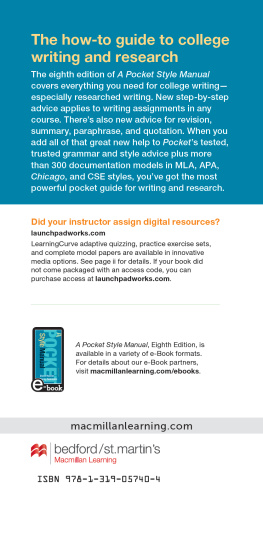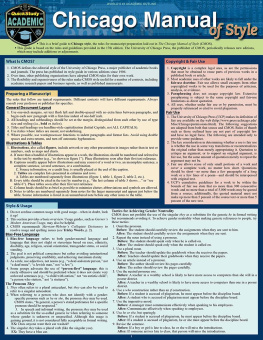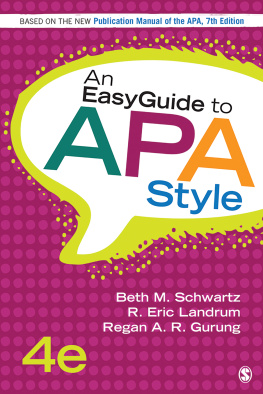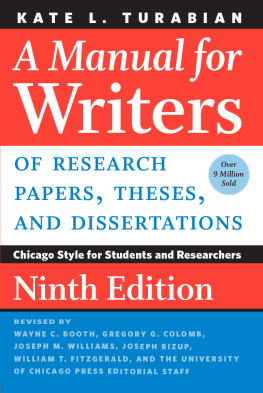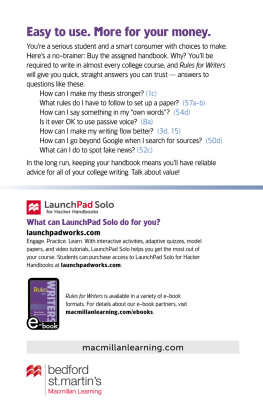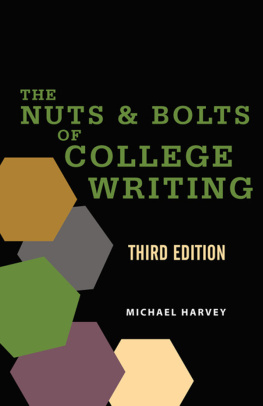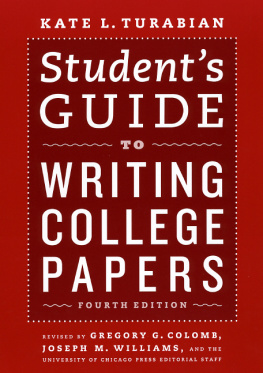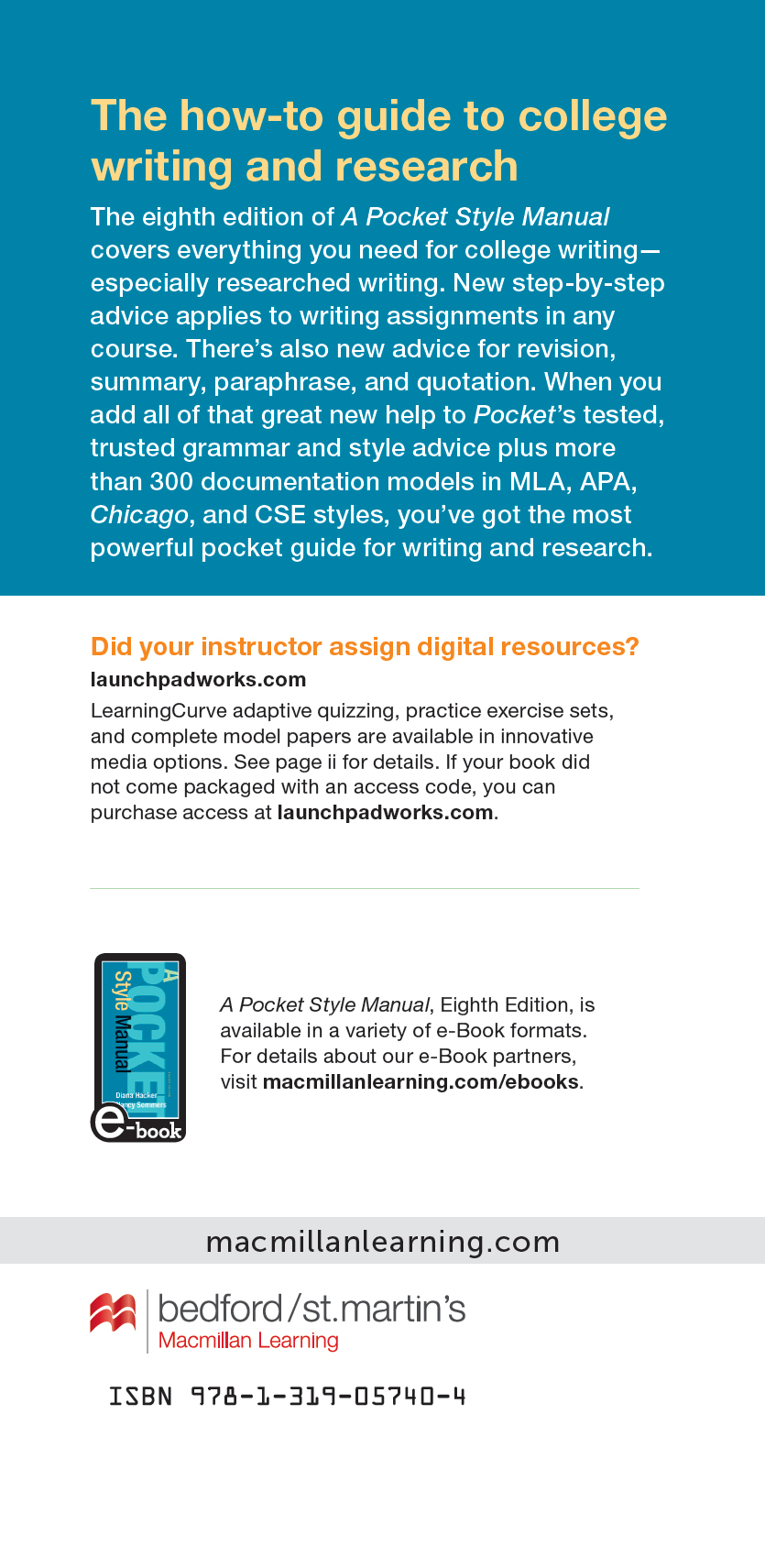
The description of the book is shown on the left as follows:
The how-to guide to college writing and research
The eighth edition of A Pocket Style Manual covers everything you need for college writing-especially researched writing. New step-by-step advice applies to writing assignments in any course. Theres also new advice for revision, summary, paraphrase, and quotation. When you add all of that great new help to Pockets tested, trusted grammar and style advice plus more than 300 documentation models in MLA, APA, Chicago, and CSE styles, youve got the most powerful pocket guide for writing and research.
Did your instructor assign digital resources?
launchpadworks.com
LearningCurve adaptive quizzing, practice exercise sets, and complete model papers are available in innovative media options. See page for details. If your book did not come packaged with an access code, you can purchase access at launchpadworks.com.
A miniature image of the e-book version is shown along with the following text:
A Pocket Style Manual, Eighth Edition, is available in a variety of e-Book formats. For details about our e-Book partners, visit macmillanlearning.com/ebooks.
The logo of bedford/st.martins is shown at the bottom along with the website macmillanlearning.com and ISBN information.
Tighten wordy sentences.
Chapter Outline
Long sentences are not necessarily wordy, nor are short sentences always concise. A sentence is wordy if it can be tightened without loss of meaning.
1a Redundancies
Redundancies such as cooperate together, yellow in color, and basic essentials are a common source of wordiness. There is no need to say the same thing twice.

The example reads as: Daniel is employed at a private rehabilitation center working as a physical therapist, where redundant word is employed is replaced with works and working is deleted. The sentence now reads as: Daniel works at a private rehabilitation center as a physical therapist.
Modifiers are redundant when their meanings are suggested by other words in the sentence.

The example reads as: Sylvia very hurriedly scribbled her name and phone number on the back of a greasy napkin, where the word very hurriedly is deleted. The sentence now reads as: Sylvia scribbled her name and phone number on the back of a greasy napkin.
1b Empty or inflated phrases
An empty word or phrase can be cut with little or no loss of meaning. An inflated phrase can be reduced to a word or two.

The first example is the example of an empty word or phrase, which reads as: In my opinion, their current immigration policy is misguided, where the phrase In my opinion is deleted and then the first letter t has been capitalized. The sentence now reads as: Their current immigration policy is misguided.
The second example is an inflated phrase, which reads as: Funds are limited at this point in time, where the phrase at this point in time has been replaced by now. The sentence now reads as: Funds are limited now.
| INFLATED | CONCISE |
|---|
| along the lines of | like |
| at the present time | now, currently |
| because of the fact that | because |
| by means of | by |
| due to the fact that | because |
| for the reason that | because |
| in order to | to |
| in spite of the fact that | although, though |
| in the event that | if |
| until such time as | until |
1c Needlessly complex structures
Simplifying sentences and using stronger verbs can help make writing clearer and more direct.
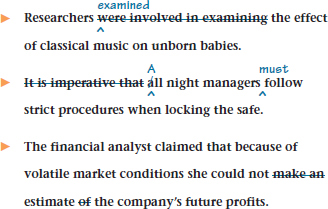
The first example reads as: Researchers were involved in examining the effect of classical music on unborn babies, where the phrase were involved in examining has been replaced with the word examined. The sentence now reads as: Researchers examined the effect of classical music on unborn babies.
The second example reads as: It is imperative that all night managers follow strict procedures when locking the safe, where the phrase It is imperative that has been deleted and all has been capitalized and another word must has been added before the word follow. The sentence now reads as: All night managers must follow strict procedures when locking the safe.
The third example reads as: The financial analyst claimed that because of volatile market conditions she could not make an estimate of the companys future profits, where the words make an and another word of have been deleted. The sentence now reads as: The financial analyst claimed that because of volatile market conditions she could not estimate the companys future profits.
Prefer active verbs.
Chapter Outline
As a rule, active verbs express meaning more vigorously than forms of the verb be or verbs in the passive voice. Forms of be (be, am, is, are, was, were, being, been) lack vigor because they convey no action. Passive verbs lack strength because their subjects receive the action instead of doing it.
Forms of be and passive verbs have legitimate uses, but choose an active verb whenever possible.
| BE VERB | A surge of power was responsible for the destruction of the pumps. |
| PASSIVE | The pumps were destroyed by a surge of power. |
| ACTIVE | A surge of power destroyed the pumps. |
2a When to replace be verbs
Not every be verb needs replacing. The forms of be (be, am, is, are, was, were, being, been) work well when you want to link a subject to a noun that clearly renames it or to an adjective that describes it: OrchardHousewasthehomeofLouisaMayAlcott.Theharvestwillbebountifulafterthesummerrains.
If using a be verb makes a sentence needlessly wordy, consider replacing it. Often a phrase following the verb contains a noun or an adjective (such as violation or resistant) that suggests a more vigorous, active verb (violate, resisted).
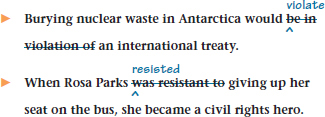
The first example reads as: Burying nuclear waste in Antarctica would be in violation of an international treaty, where the phrase be in violation of has been replaced by violate. The sentence now reads as: Burying nuclear waste in Antarctica would violate an international treaty.
The second example reads as: When Rosa Parks was resistant to giving up her seat on the bus, she became a civil rights hero, where the phrase was resistant to has been replaced with resisted. The sentence now reads as: When Rosa Parks resisted giving up her seat on the bus, she became a civil rights hero.
Next page
